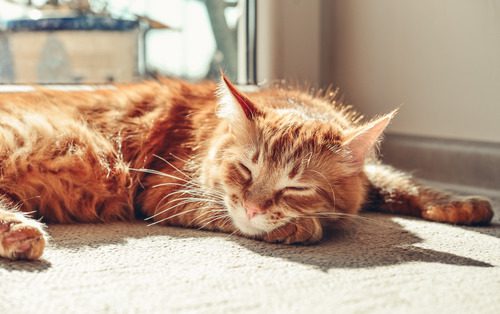Cats are known for their agility, grace, and poise, but when something interrupts their smooth movements, it can be unsettling for pet owners. Muscle tremors in cats are one such issue that can leave owners worried and searching for answers. These involuntary muscle movements can range from mild and barely noticeable to severe and persistent. Let’s dive into the common causes of muscle tremors in cats and what you can do to support your feline friend.

What Are Muscle Tremors in Cats?
Muscle tremors in cats are rhythmic, involuntary movements caused by repeated muscle contractions. They may occur in a specific area of the body, such as the legs or head, or involve multiple muscle groups at once. These tremors can be constant or intermittent and might vary in intensity. Cats experiencing muscle tremors often display other symptoms, such as lethargy, changes in behavior, or difficulty walking. While occasional mild tremors might not be a cause for concern, persistent or severe episodes could indicate an underlying health issue. You’ll want to observe your cat closely and consult your veterinarian if these symptoms persist.
What Could Be Triggering Muscle Tremors in Cats?
Muscle tremors in cats can arise from a variety of factors, some more serious than others. Here are the most common causes:
Neurological Disorders
Issues in the brain, spinal cord, or nerves can interfere with normal muscle function. Conditions such as epilepsy, cerebellar hypoplasia, or nerve damage might lead to tremors. Cats with neurological disorders might exhibit additional signs, including uncoordinated movements, seizures, or unusual behaviors. If you notice these symptoms along with muscle tremors, it’s critical to contact your veterinarian.
Toxicity or Poisoning
Exposure to toxins or ingesting harmful substances can lead to muscle tremors in cats. Common toxins include household chemicals, certain plants (such as lilies), and medications not intended for cats. Tremors caused by poisoning often come on suddenly and may be accompanied by drooling, vomiting, or seizures. If you suspect your cat has ingested a toxic substance, do not attempt home remedies. Instead, call Central Broward Animal Hospital at (954) 792-6223 for immediate guidance.
Electrolyte Imbalances
Electrolytes, such as potassium, calcium, and magnesium, play a vital role in muscle function. An imbalance in these electrolytes can disrupt normal muscle activity and lead to tremors. Dehydration, kidney disease, or malnutrition are common culprits behind electrolyte imbalances in cats. Symptoms of an electrolyte imbalance might include lethargy, muscle weakness, and abnormal heart rhythms. Your veterinarian can perform blood tests to diagnose and treat this issue effectively.
Infectious Diseases
Certain infections, particularly those affecting the nervous system, can cause muscle tremors in cats. For instance, feline infectious peritonitis (FIP) and toxoplasmosis are known to impact the nervous system and lead to tremors or seizures. Cats with infectious diseases may also display fever, loss of appetite, and behavioral changes. If your cat shows these symptoms, a prompt veterinary visit is essential.
Pain or Stress
Pain and stress are often overlooked but can be significant contributors to muscle tremors in cats. Pain from injuries, arthritis, or other physical issues can trigger tremors as the body reacts to discomfort. Similarly, stress or anxiety caused by changes in the environment, loud noises, or unfamiliar situations can lead to temporary tremors. While mild stress-related tremors may resolve on their own, ongoing episodes warrant further investigation by a vet.
Genetic Predispositions
Some cat breeds are more prone to conditions that cause muscle tremors. For example, certain hereditary neurological conditions might manifest as tremors in breeds like Siamese or Persian cats. Understanding your cat’s breed-specific health risks can provide valuable insight into their symptoms.
Medications and Side Effects
Certain medications prescribed for unrelated conditions might have side effects, including muscle tremors. For instance, some sedatives or treatments for seizures can occasionally result in these movements. If you suspect a medication is causing tremors, consult your veterinarian before making any changes to your cat’s treatment plan.
When Should You Seek Veterinary Care?
While occasional mild tremors might not always indicate a serious issue, persistent or severe tremors should never be ignored. Here are some signs that warrant immediate veterinary attention:
- Tremors lasting more than a few minutes
- Accompanying symptoms such as vomiting, seizures, or difficulty walking
- Changes in behavior, such as aggression or withdrawal
- Rapid onset of tremors without a clear cause
The team at Central Broward Animal Hospital is here to help. Call (954) 792-6223 to schedule an appointment and ensure your cat receives the care they need.
Preparing for Your Veterinary Visit
Before your visit, take note of important details that can help your veterinarian diagnose the issue:
- Frequency and duration of the tremors
- Specific muscles or areas affected
- Any potential exposure to toxins
- Changes in your cat’s behavior, appetite, or activity levels
Providing this information can significantly aid in determining the cause of your cat’s muscle tremors.
Supporting Your Cat’s Health and Comfort
When dealing with muscle tremors in cats, it’s essential to focus on providing a safe and comforting environment. Here are some tips:
- Create a quiet, secure space where your cat can relax without distractions.
- Ensure your cat is eating a balanced diet to support overall health.
- Keep harmful substances out of reach, including medications, plants, and cleaning products.
- Schedule routine veterinary visits to catch any potential health issues early.
Muscle tremors in cats can be alarming, but you don’t have to face them alone. At Central Broward Animal Hospital, we understand how important your cat’s well-being is. Our team is dedicated to diagnosing the root cause of your cat’s symptoms and providing tailored treatment plans. If your cat is experiencing muscle tremors, don’t wait to seek professional care. Call us today at (954) 792-6223 to schedule an appointment. Together, we’ll work to keep your feline companion healthy and happy.
